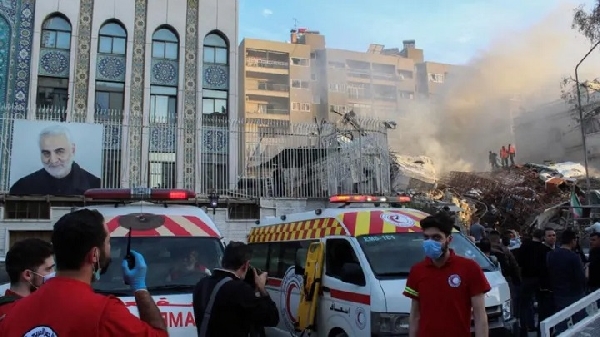Ghanaian UK nurse who died of COVID-19 featured on Aljazeera as victim of racial divide

Five days after giving birth in 2020, Mary succumbed to the virus.
The AlJazeera documentary considered her death as possibly avoidable due to the level of protection, duties and exposure people of colour were mostly subjected to at the height of the pandemic.
This is despite lack of full clarity on where Mary Agyapong got her infection from which eventually killed her. Many, including her family members say they believe she caught Covid-19 in the line of duty at the hospital.
The docuseries featured how health workers of certain races were probably given worse and dangerous task assignments which exposed them to certain dangers compared to others from some “particular” races.
At the conclusion of an inquest at Luton and Bedfordshire Coroners Court Coroner Emma Whitting said: “Mary died after contracting Covid-19 but it remained unclear where and when her exposure to the virus had occurred.”
Mary died at the start of the first wave of the pandemic, five days after the birth of her daughter by emergency caesarean section at Luton and Dunstable Hospital.
Mary had attended Luton and Dunstable hospital, where she worked, on April 5, 2020, “breathless, exhausted and weak”, her husband Ernest Boateng told the inquest. She was tested for covid and was discharged.
Ernest said: “When I saw her, she looked absolutely appalling. I could not believe that she had been discharged from the hospital in her state, as she was so poorly.”
Two days later, at midnight, when Mary was struggling to breathe, Ernest called for an ambulance, which arrived two and a half hours later. He was not able to accompany Mary to the hospital because of covid restrictions.
It was decided to deliver the baby by caesarean, and Ernest had to wait in the hospital car park. Baby Mary was transferred to the premature baby unit and her mother was taken to the intensive care unit where her breathing deteriorated to such an extent that she required sedation and intubation. Mary was not able to hold her baby due to Covid.
Ernest said: “I was getting more and more anxious at the fact that both Mary and my new-born daughter were alone and I felt helpless that I could not see or comfort either of them.”
In the early morning of 12 April Ernest was told by telephone that Mary was expected to die. By the time Ernest arrived at the hospital, Mary had already died.
Medical staff told the inquest they were content that adequate care had been given to the patient, and that her condition was properly monitored throughout her time in hospital.
Ernest said: “I have real concerns about Mary working whilst heavily pregnant in such a very stressful and in my view risky situation.”
He said that following Mary’s death, other clinicians told him they had raised concerns about safety at work and lack of protective equipment available to frontline staff in the midst of the pandemic.
He added: “The death of someone you love is always sad, but the shocking way in which Mary died is something we will live with for the rest of our lives. I do not want Mary to die in vain and hope that changes can be made to ensure that all women who reach 20 weeks of pregnancy be allowed to work from home or be suspended on full pay. As no family should ever have to go through what I have.”
At the conclusion of the inquest into Mary’s death, the coroner said:
“After collapsing at home on the morning of 5 April 2020 when 35 weeks pregnant with her second child, the Deceased was diagnosed with suspected Covid-19 at the A&E department of the Luton & Dunstable Hospital where she was employed as a Senior Nurse.
“She was discharged the same day but, following a deterioration at home and a further assessment in the same A&E department in the early hours of 7 April 2020, she was admitted to the Labour Ward.
“She was the hospital’s first pregnant patient with suspected Covid-19. A decision was taken to deliver her baby by caesarean section which was successfully performed at 23.41 hours that night; however, her condition did not improve and by the following morning she was requiring increasing levels of oxygen.
“A Respiratory review at 13.25 hours on 8 April 2020 concluded that she was showing signs of severe Covid-19 pneumonia and, following a sudden deterioration at around 15.00-15.30 hours, this was confirmed by chest x-ray. She was intubated and admitted to the Intensive Care Unit but her condition deteriorated further and, in the early hours of 12 April 2020, she was diagnosed with a cytokine storm.
“Despite all efforts to treat her, she suffered a cardiac arrest later that morning and her death was confirmed at 10.30 hours.”
The coroner added:
“Whilst Mary’s untimely death is first and foremost a tragedy for you her husband, for her children, and all her relations, colleagues and friends, it is for society too.
“As a society, it is important that we learn from all of the lives that have been lost as a result of this terrible pandemic and to consider the wider policy implications that may be lost from each and every one of these.
“Since this is a process which goes far beyond a coroner’s inquest and the Prime Minister has indicated his intention to hold a full public inquiry into the Covid-19 pandemic, I urge him to proceed with this as soon as practicable.”
Following the conclusion of the inquest into his wife’s death, Ernest Boateng said:
“The sudden death of my wife and the mother of our two children has been the hardest pain to bear. In those early days after Mary’s death, I was only able to carry on because of the need to care for our children and provide them with a loving home.
“Mary was strong, capable, vibrant, full of life and the most precious person in my life. It is still difficult to believe that she lost her life to the COVID-19 virus.
“I am glad that those who were involved in Mary’s care in the final weeks of her life have had to give a full account of what happened. I hope that the fact that they have had to do so will remind them of the need to always give the best possible care to women in Mary’s situation – especially black women who are themselves on the frontline of healthcare.”
A GoFundMe page set up by family friend Rhoda Asiedu has raised more than £186,000 and she said the money had been placed into a trust for Mary’s kids.





